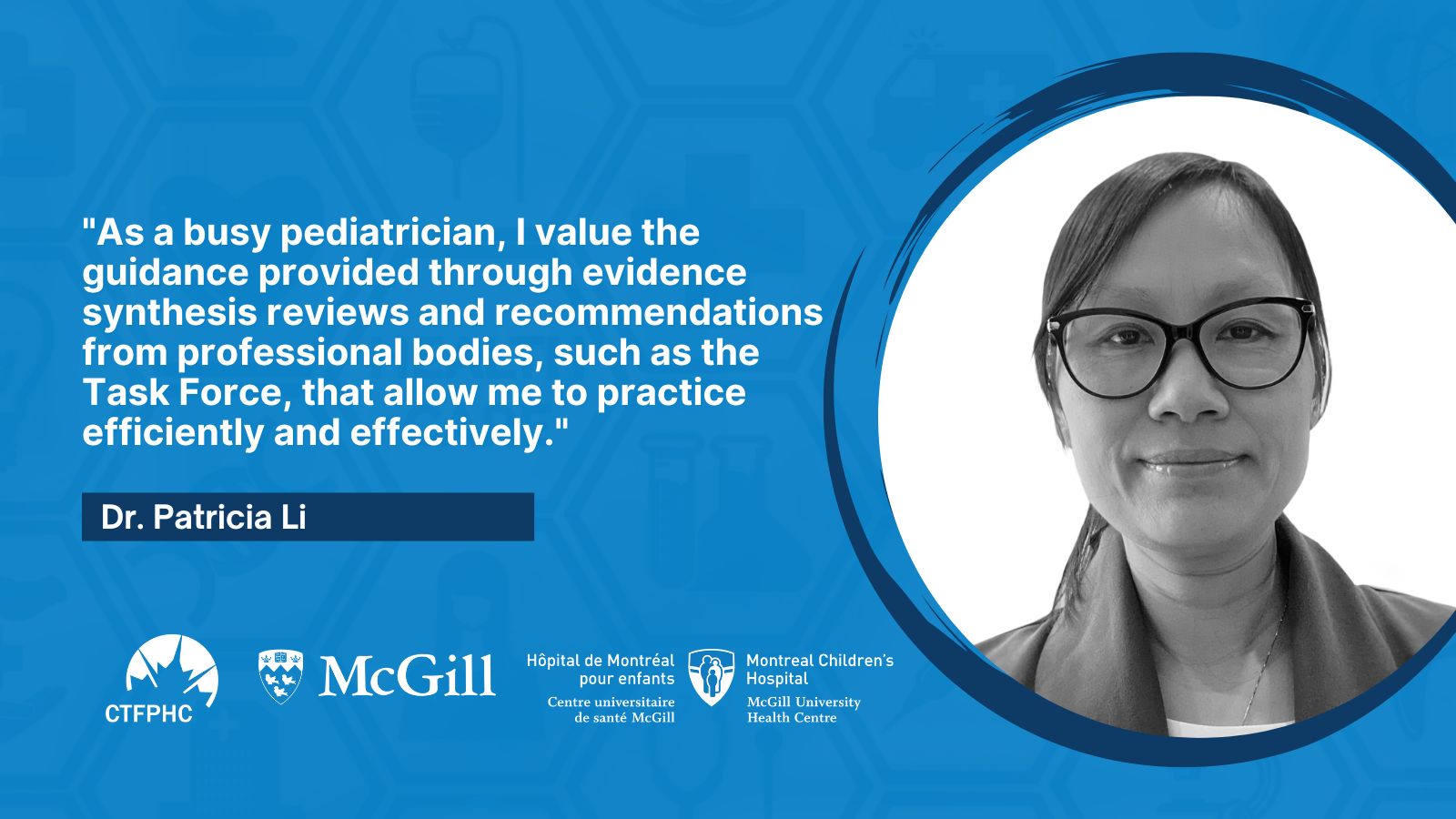From a nurse practitioner to a family doctor, a gastroenterologist and pediatrician, the Task Force’s four new members bring varied perspectives and a wealth of experience to guideline development. Meet Drs. Jennifer Flemming, Patricia Li, nurse practitioner Nathalie Slavtcheva and Dr. Keith Todd, who is also a graduate of our Fellowship program.
They share interest in preventive medicine, collaboration as well as outdoor activities with family and friends. Read about why they joined, what they hope to accomplish and what they do when not working.
Dr. Jennifer Flemming
Gastroenterologist/hepatologist, Kingston Health Sciences Centre and Associate Professor, Queen’s University, Kingston, Ontario

Why did you decide to join the Task Force?
Although I am not a primary care physician, as a hepatologist the majority of morbidity and mortality I encounter from managing patients with chronic liver diseases (including viral hepatitis, alcohol, and non-alcohol related fatty liver disease) could have been mitigated through primary prevention. Therefore, I am interested in investing time related to the primary prevention of all chronic liver diseases to benefit the health of Canadians.
What prompted your interest in evidence-based medicine/guidelines?
My interest in evidence-based medicine is a result of the strong training programs and influential mentors I have had along my journey. The ability to provide clinicians and Canadians with the best possible scientific evidence to prevent developing chronic disease is foundational to the healthcare system.
What do you hope to accomplish as a member?
As a Task Force member, I hope to provide a different perspective on primary prevention from the lens of a speciality physician. I also welcome the opportunity to learn from the other team members surrounding the development of clinical guidelines and contribute to this important process.
When she’s not working…
I enjoy spending time with my husband and two boys (7 and 9) and our close circle of friends and family. I enjoy being physically active and spend many summer mornings out on my road bike with friends and colleagues and in winter on my Peleton. I am also a huge sports fan and have developed a love of playing in a fantasy football league and travelling to watch my kids play sports and watching sporting events.
Dr. Patricia Li
Pediatrician, Montreal Children’s Hospital, Associate Professor, McGill University

Why did you decide to join the Task Force?
In terms of my research career, I joined the Task Force as it seemed to be a logical and natural next step in my journey. For over a decade, I have been fortunate to work as the epidemiologist for the Rourke Baby Record, a tool used by primary care providers across Canada for preventive care of children 0 to 5 years old. In this role, I have helped review the evidence related to early childhood nutrition, injury prevention, behaviour and family issues, environmental health, developmental screening, physical exam, investigations and other issues to inform the Rourke Baby Record updates every 3-4 years.
As a busy pediatrician, I value the guidance provided through evidence synthesis reviews and recommendations from professional bodies, such as the Task Force, that allow me to practice efficiently and effectively.
What prompted your interest in evidence-based medicine/guidelines?
Having completed my medical school at McMaster University, we were taught by pioneers of evidence-based medicine and we were immersed in the culture of evidence-based care from day 1. My Master’s thesis in epidemiology involved looking at guidelines-based care for asthma in emergency rooms in Ontario. Through all of these experiences, and from working on the Rourke Baby Record, I have learned to appreciate the complexities of interpreting the evidence, generating guidelines, and practicing evidence-based medicine.
What do you hope to accomplish as a member?
I hope to meaningfully contribute to the generation of guidelines and at the same time, I am eager to learn from the process and the team collaboration. I hope to be able to look back on my career and see this experience as a highlight.
When she’s not working….
I am fortunate to be at a workplace where I am surrounded by my closest friends, where we support each other in our professional and personal goals. When I’m not working, I love spending time with my family and kids to take long hikes and enjoy the 4 seasons of Montreal, cook, laugh, and be silly together.
Nathalie Slavtcheva
Nurse practitioner, Montreal area and clinical lecturer, University of Montreal

As a primary health care nurse practitioner in the Montreal area, Nathalie Slavtcheva brings a different perspective to the Task Force. It was her desire to help people that made her choose nursing and a chance to work in epidemiological research while studying at McGill University that developed her interest in preventive care and evidence-based medicine.
“Having a caseload of around 700 patients in primary care, I know how important it is to carry out studies to improve the care we give, but unfortunately, health professionals do not always have the time to read everything and adjust their practices, especially in primary care. We will often turn to guidelines, guides, and continuing medical education to update our practices and knowledge to continue to offer our patients the best care,” says Ms. Slavtcheva.
A clinical lecturer in the Department of Family Medicine and Emergency Medicine at the University of Montreal, she is also active in improving communication, updating knowledge and practices on evidence-based data to improve patient care. She also collaborates in clinical research in f HPV, women’s health and pediatrics.
When she’s not working…. I am often gardening or spending time with my kids. We like to hike or take walks altogether.
Dr. Keith Todd
Family physician, Jewish General Hospital and Assistant Professor, McGill University and a graduate of the Task Force’s Fellowship Program

Why did you decide to join the Task Force?
I use Task Force guidelines every day to help me communicate to patients the benefits and harms of a given medical test. During my time as a Task Force fellow, I helped formulate prostate cancer screening guidelines, which gave me insight into the extensive process of guideline development. The experience made me want to collaborate with this excellent group of clinicians and researchers on other projects.
What prompted your interest in evidence-based medicine/guidelines?
I’ve always been interested in data-driven decision making in medical practice. As a medical student, I was surprised to learn how little evidence there was for some of things that are/were done in medicine, especially given the harms that can result. As a clinician, I now have conversations about screening on a daily basis; communicating the benefits and potential harms, though, is far from straightforward. Through my work on the Task Force, I hope to help simplify these discussions for clinicians and patients.
What do you hope to accomplish as a member?
I’m a fairly pragmatic person, so I hope I can help bring clear and actionable guidance to topics relevant to primary care.
When he’s not working…
Outside of work, I spend time with my family, taking kids to their sports or music classes. We like to get outside and enjoy nature as much as possible.


